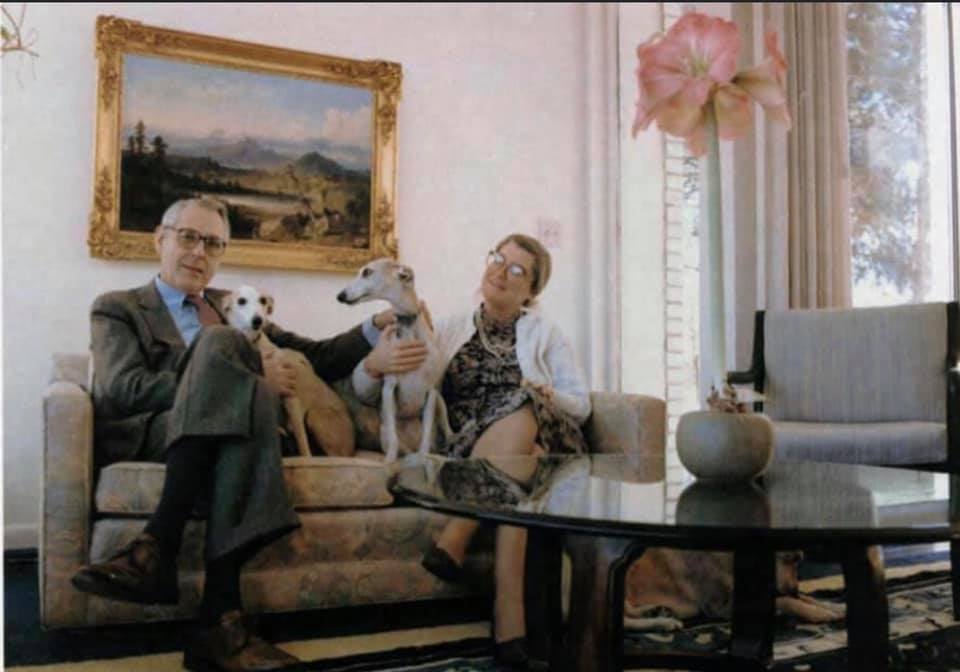Brendan W. Clark ’21
Editor-in-Chief
Trinity College President James Fairfield English, Jr., LHD ’89, passed away on June 2 at the age of ninety-three. English, who led Trinity from 1981-1989 first as Acting President and then as President, oversaw a period of expansion and renovation at Trinity. English was also the College’s Chief Financial Officer from 1977-1981 and a graduate of Yale College, Cambridge University, and the University of Connecticut School of Law.
The Tripod spoke with Edward A. Montgomery ’56, LLD ’95, Chairman of the Board of Trustees during English’s tenure. Montgomery recalled fondly that English was among the “most caring people I have ever known.”
English, a World War II veteran and former bank executive with the Connecticut Bank and Trust Company in Hartford for 26 years, was known around campus for his two dogs, both whippets, and his kindhearted nature and commitment to cooperation.
Montgomery, who was also a bank executive, recalled English as a “dedicated fundraiser for the College” during his tenure as its 16th president. The Tripod, too, recognized this in a report upon his retirement, noting that the “Campaign for Trinity, a three-year fundraising effort which has collected over $48 million for the college, was initiated under English.”
“I nearly became a scholar, but I’m not a scholar,” English told the New York Times in 1981 prior to his inauguration. However, his attentive concern with the College’s curricular offerings would beg to differ with this assessment. During his time as president, in collaboration with the faculty and governance committees, the College expanded its major offerings and saw the institution of a new curriculum and the five distribution requirements that remain in place today. Trinity also joined the CTW Consortium during his tenure, a program which continues to provide students with access to vast research materials from across Connecticut’s NESCAC liberal arts institutions.

His connection and involvement with students were also immensely important and evident in the College’s historical annals: English told the Tripod in 1989 that “student activism is a very important part of undergraduate life” and lauded those who involved themselves in “student government, community outreach, and in the establishment of their own organizations.” Likewise, he “greatly enjoyed the close contact with students which he developed in his first years at Trinity,” the Tripod reported.
Montgomery recalled that under English’s fine leadership, the College “never ran a deficit” and added that while he may have appeared a finance man at first glance, his “concern was always with what he could do to make the students have a better experience.” English even served as a faculty advisor to students who took his “Society, Business and the Individual course” during his early tenure as acting president.
President and Professor of History, Emeritus, Borden W. Painter, Jr. ’58 spoke with the Tripod and recalled English as “an excellent steward of the college, a successful banker who had toyed with going the academic route after study at Cambridge.“ Painter, who was then filling in as interim Dean of the Faculty, added that English was “much more organized than I so I had to be on my toes.”
Former Associate Academic Dean J. Ron Spencer ’64 recalls that English would often drop by “sometimes just to chat, but more often to seek advice about some member of the faculty, or an issue with which he was dealing, or the freshman seminar he was teaching on Society, Business, and the Individual.”
“Jim and Isabelle were Hartfordites born and bred,” added Associate Professor of History, Emeritus, Michael Lestz in a statement. Lestz noted that the English family “loved the city and both played a role in making it better. In every circle of the Hartford community, Jim had stature and tried hard to move the city forward through urban renewal, the recovery of historic neighborhoods, philanthropic efforts, and economic infrastructure projects.”
English was a respected civic leader within the Hartford community, known for his service on the boards of Hartford Hospital, the Wadsworth Atheneum, and Connecticut College. English also led the boards of the Loomis Chaffee School, the Hartford Foundation for Public Giving, and the Connecticut Health and Educational Facilities Authority. In retirement, he also served on the boards of the Community Foundation of Eastern Connecticut and the Mystic Seaport Museum.
English’s wife, Isabelle Spotswood Cox English, was also actively involved with Trinity as its first lady and received an honorary doctorate of fine arts from the College in 1988 for her service. She was also a talented gardener “who did much to enhance the campus landscape,” added Painter. Lestz, too, recalled that Isabelle was with English “every step of the way and nudged him to take on some tasks he might have forgone.”
With fondness, Montgomery recalled that English was never one to continue to hold control and he “always believed that the new president should take over and run the College their way.” Even so, said Montgomery, he “remained a staunch supporter of the College” in his retirement.
Painter, too, recalled that the two “kept in touch” and that when faculty established a retired faculty group, English made “several generous financial contributions to get us going” even though living in the seaside hamlet of Noank, Connecticut limited his attendance at meetings.
English was a “fluent conversationalist who was invariably curious to hear what young people on the faculty had to say,” said Lestz. He led the College with “enormous grace and I remember his years as President fondly and will miss him.” Paul E. Raether Distinguished Professor of History Cheryl Greenberg also remembered English as a “lovely and kind man” who was always “serious about what we were all doing” at Trinity.
In a letter to the community Thursday afternoon, President of the College Joanne Berger-Sweeney noted that English is survived by his wife, Isabelle Spotswood Cox English; children James Fairfield English III, Margaret Stuart English Unsworth, and William Berkeley English; 10 grandchildren and eight great-grandchildren. He was predeceased by his daughter Alice Bradford English Johansson and sister Janet English Dorman. “I extend our deepest sympathies to the entire English family,” Berger-Sweeney added.
“He did his job and he did it well,” Montgomery noted. Painter echoed these sentiments, adding that he was a “genuinely kind man and he cared deeply about the College.” Spencer, too, could recall “few personal acquaintances as intelligent, thoughtful, considerate, and decent as Jim.” “Like many others who came within his orbit,” Spencer added, “I shall sorely miss him.”
Trinity, doubtless, was made better by the service of President English and he will indeed be missed by the institution, the faculty and staff with whom he served, the alumni who spent their undergraduate years under his leadership, and the current students who reap the benefits of his stewardship and work.
Speaking on the value of the Trinity education, English’s 1989 Commencement Speech proffers words of wisdom to the graduate which ring as true today as they did thirty years ago: “The job ahead is nothing less than to help create a better way of life for yourselves and for everyone: healthy, orderly and fair.” A commitment to those values, English said, will truly “be the finest product of your Trinity education.”






Douglas: As a naive young freshman, I stopped by his office to introduce myself in the first days of school. Naturally, he was immediately gracious and welcoming.
David R Lenahan ‘84: As part of my work-study financial aid package I worked at and became a Student Manager at SAGA Foodservice. As an adjunct to this role, I was fortunate to be selected by our reserved erudite President English and his lovely effusive wife Isabelle as their preferred bartender for the many events occurring constantly at The President’s House on campus. I miss them both and felt truly blessed when, upon the birth of our first child 5 years after graduation, an antique Sterling Silver Spoon arrived via UPS. It was a baby spoon with
curled handle. Obviously, Isabelle sent it. President English had a wonderful graduation or convocation speech called “The Value of a Liberal Arts Education” that should become required reading for all Americans. If it was indeed required, those who take a myopic view of the current unrest in this torn country might take a pause, emerge from their Igloos of blind ideological prisms coloring what they see, and stand for systemic change. I write today during the ongoing Civil Unrest over Police Brutality in George Floyd’s murder. It appears that despite recent arrests of the killer and ineffectual Police bystanders who should have interceded to protect George Floyd, most Americans can only consider the situation from their own ideological perch. Clearly all Americans – Democrat or Republican- of ALL skin colors would benefit from applying Jim English’s “consider the matter from BOTH sides” Liberal Arts perspective! Respectfully submitted, David R Lenahan ‘84
trinitytripod: Thanks for the submission of that memory, David. We’re always grateful at the Tripod when an alumnus shares his thoughts about the school and those individuals who have defined its history.